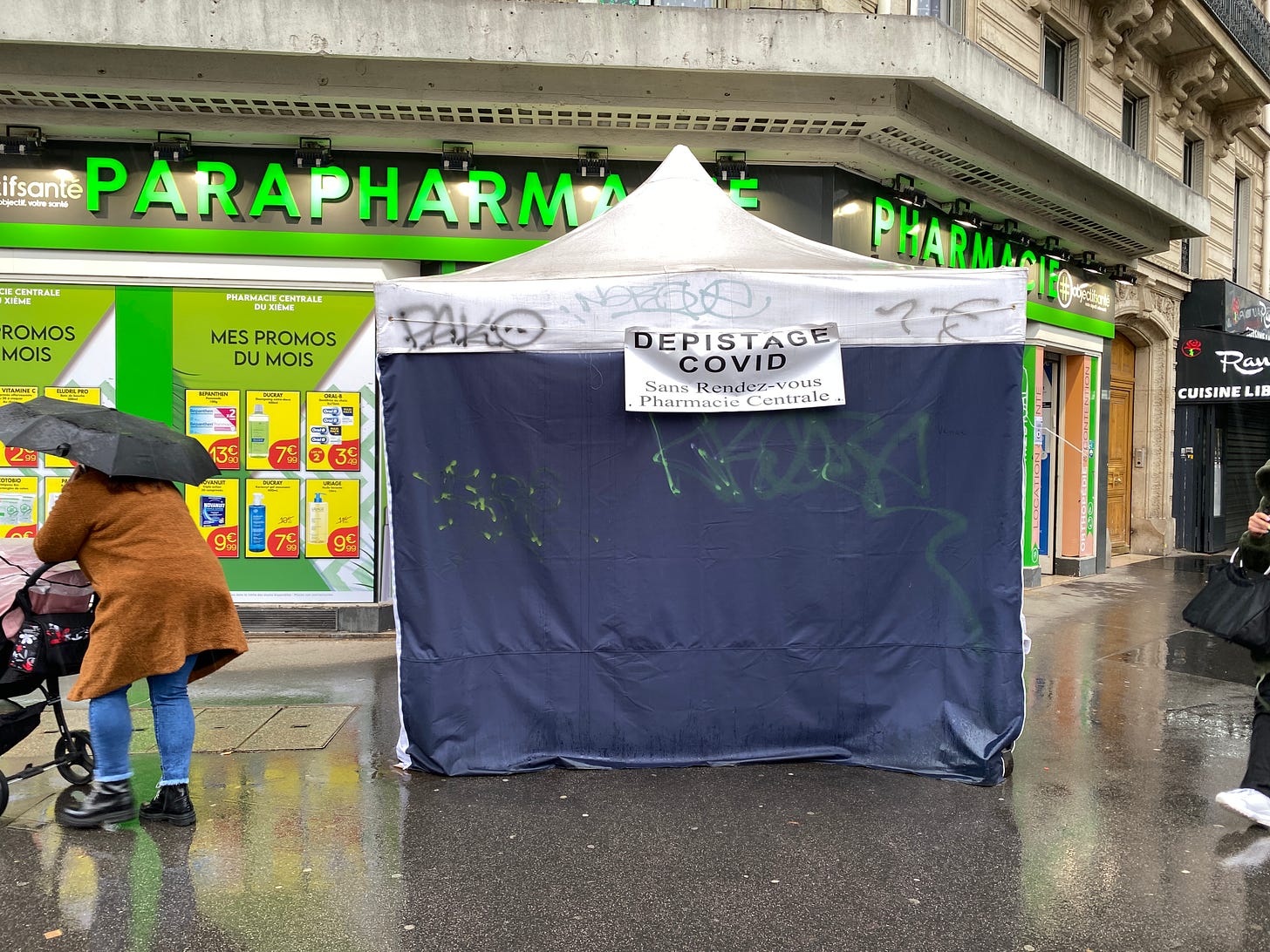I’ve been getting a number of questions about whether or not people should come to France. Life is seemingly back to normal for most people and France is reporting a 30% occupancy rate for hospital beds at the moment, and 28% of those tested for Covid are testing positive. (Source: Sortira Paris) So while I can’t tell you whether to come or not, here’s some information:
As of mid-March, masks are no longer required outdoors or indoors in France except on public transit and in health-care facilities. A few businesses, however, may request/require people to wear them, but a wide majority don’t. Some people are still wearing masks, however, which are widely available at pharmacies and grocery stores and are inexpensive; I’ve seen boxes of 50 standard surgical masks selling for as low as €3 a box, and the more effective, K95- and KN95-style masks, known as FFP2 masks in France, selling for around €15 for a box of 30-40.
With an impending (and contentious) election coming up, with a lot at stake, no one is racing to re-require mask-wearing and enact other precautions or closures. The first election round is April 10 and the second round is April 24, which happens if no candidate gets a clear majority between the two highest vote-getters. It’s improbable any of the policies in France will change until (at least) after April 24, if they do.
You are no longer required to have a pass vaccinal or show proof of vaccination to eat in restaurants, go to bars or cafés, or visit tourist sites. Most vaccinated travelers do not need to show a negative test result to enter France anymore. Entry requirements for visiting France from other countries are provided here. (Which are subject to change.)
So…should you come?
No one can see the future, and I can’t tell you whether or not to come. Much depends on your personal comfort level with the risks involved and how nimble of a traveler you are, and how “adaptable” you would be should things change. That’s a question you can only ask yourself. Infection numbers have been climbing very rapidly in France, and some are speculating that the “let ’er rip” policy in some countries, including France, may not be the right strategy.
(Last week, the seven-day average number of cases in France was 136k cases per day, and after a dip a few weeks back, cases began to trend steadily upward again. Eighty-one percent of the French population has received at least one dose of the vaccine. More statistics here.)
Some people are wearing masks in France, but the majority aren’t. If you want to wear a mask, though, you would not feel awkward as some people are indeed wearing them. You won’t be made to feel uncomfortable if you do. Some shops are requiring their staff to wear them but they may not be required for customers. If in doubt, enter wearing a mask and ask if they’d like you to keep it on.
If you do come:
Although it likely won’t happen soon, like anyone traveling these days, anywhere in the world, you should be prepared for a possible lockdown, which we’re seeing in other parts of the world. In France, lockdowns have historically been announced days or weeks in advance, which would give travelers time to head home if they wanted or needed to. Depending on how the current wave goes, and subsequent ones, anyone traveling these days should be prepared for anything.
You don’t have to go overboard, but it’s helpful to have a backup plan for travel, such as if a train voyage or part of a trip, or tour, gets canceled. Travel to and in France has historically been disrupted by strikes, for example, so it’s best to come with a flexible schedule…and mindset.Be sure to have enough funds to cover an extra week or so of staying put, just in case you can’t make it out if you get infected and/or can’t travel for another reason. While I don’t see that happening, things change, and some countries are letting non-vaccinated people back in, while others are still requiring negative tests or proof of vaccination. (You can buy rapid antigen tests at most pharmacies and some grocery stores in France. I bought some at €3 a pop.)
Many pharmacies still offer the swab tests in tents outside or inside, which cost about €25 for a rapid test and €45 for a PCR test if you’re not in the French healthcare system. (I’ve had great luck getting PCR tests with rapid results at this laboratory.) If you need PCR results fast, wherever you get tested, ask if they can expedite it. While airports have testing facilities, to avoid waits and for your peace of mind, I strongly recommend getting tested before heading to the airport. Wherever you go, there is a little bit of paperwork to fill out so bring a pen and your smartphone, as you may need to download a QR code. If instructions are in French, usually someone at the pharmacy can assist you in English, if you ask.
If you book a tour, buy airline tickets, or make hotel reservations, make sure they’re refundable or transferable and read the fine print to see and understand the conditions. If you have questions about cancellation policies, ask first and retain any communications on the subject. Using a credit card to pay may help if you have difficulty getting a refund, but it’s always better to contact the business first before canceling a charge on your credit card or asking your credit card company to intervene.
Strongly consider travel insurance and check its Covid coverage. Due to the ongoing pandemic, many insurance policies now include Covid coverage, but not all. Be sure to know what your policy (and health insurance plan) covers and what it doesn’t.
Speaking of cancellations, if you have restaurant reservations in France and for whatever reason you can’t make it, please cancel if you can’t come. Restaurants are having a lot of problems with no-shows (from locals and visitors), and since many have limited dining space, it’s polite to cancel so they can fill the table, which they can usually do even if it’s at the last minute.
In Paris, cafés and restaurants will be allowed to rebuild open-air terraces again this spring. (Neighbors in some parts of town aren’t happy about them due to the noise of last-night revelers and parties.) Restaurants and cafés in France tend to be quite small with tables close together and little to no ventilation and even in the summer, windows may be kept closed as people are generally wary of courants d’air, or drafts. (Same on public transit.) So you should expect to be seated close to other people if dining indoors. If you’re more comfortable dining outside, if available, let them know when you arrive or when you reserve. Note that smoking is prohibited indoors in restaurants and cafés but not on terraces, so expect cigarette smoke if dining outside.
Keep an eye on Covid indicators in France. The New York Times tracks those here, as does the French government here (in French), which you can filter by region. Read advisements from the U.S. Embassy in France and follow them on Instagram, where they post the latest travel information, although more is available on its website. U.S. travelers can also enroll in STEP alerts to be informed of any changes or emergencies. The official French website in English is helpful as well, although sometimes things change quickly and the website can take a few days to reflect any changes.
Related Posts:
France reopens to Americans and others
Latest Covid Updates (Secrets of Paris)
You Tested Positive in a Foreign Country. Here’s what you should do. (Washington Post)








I took two trips to France this last month. I just came back from the most recent one yesterday. Everything David says is on point. I just would add that despite most everyone in France being "over it," you can comfortably wear a mask if you are worried and pick restaurants where spacing is good. On this last trip I traveled with my granddaughter (who was vaccinated and had had Omicron, so she was super safe), but I needed to take some precautions because I could not afford a positive test and be stuck with her (she is just 7) in the hotel before returning to the US. Where masks are especially needed: in taxis. In museums, where the crowds are tremendous (eg Musee d'Orsay). In elevators. But a good mask goes a long way and despite the recent surge, I did not catch the virus. We ate out three times a day and did everything I would have done with her before the pandemic. And it was unseasonably cold, so we could not eat outside. One tip for older adults: get your second booster two weeks before you go! The vaccination gives you solid protection against infection for about 3-4 weeks (after initial two week wait) as per NYT article today. I did that for extra security. That requirement of a negative test result to return to the US is a menace for traveling families! One tiny bright note: we felt very safe on the flight back!
I returned from Paris to the bay area last week. As David writes, restrictions have been 99% removed (and the ones that remain, e.g. for public transport, are not being enforced). The challenge is the US's requirement for a negative test 24 hours before departure. I tested negative, my travel companion positive. He had to prevail on our hotel to let him stay an extra (indeterminate) amount of time. They were lovely and accommodating and brought him breakfast and helped w takeaway etc., but of course it still cost a fortune. Eventually he had to pay a local doctor 300 Euros to come to the hotel and provide him with a letter clearing him for travel (people can continue to test positive for quite a while). I traveled home but tested positive the evening of my arrival. We are both vaccinated + boosted, but even "mild covid" is no fun. I would personally not travel to Europe again until the US lifts the requirement for a negative test. Apparently the current variant is very transmissible and Europeans seem 100% over it; the election contributes to this too. Of course we had a lovely time prior to all this! -- and I am grateful for the vaccine and for the opportunity to travel.